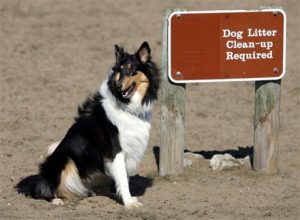
Believe it or not, this week is National Scoop the Poop Week. We know: On a scale from one to 10 of enjoyable things to do, picking up your dog’s poo-poo surprises probably rank somewhere between zero and negative infinity. But picking up after your dog is important, and your job as a responsible pet owner.
The day after Earth Day April 22 starts a week everyone should give a crap about, doggone it, and that is “National Scoop the Poop Week.” The Association of Professional Animal Waste Specialists, an organization of professional pooper-scoopers, founded the week in 2002 to educate pet owners on the importance of cleaning up after their dogs.
The doggie doo-doo is big business – estimated in the tens of millions of dollars — and more people are stepping in it every day
Even the United States Environmental Protection Agency has this to say about cleaning up pet waste: “Pet waste can be a major source of bacteria and excess nutrients in local waters. . . Flushing pet waste is the best disposal method. Leaving pet waste on the ground increases public health risks by allowing harmful bacteria and nutrients to wash into the storm drain and eventually into local waterbodies.”
America’s 78.2 million dogs collectively deposit 10 million tons of waste per year, according to waste clean-up service, Doody Calls. That’s enough to fill some 268,000 tractor trailers.
How much do you know about picking up your No. 1 furry friend’s No. 2? See if you can spot the facts from the fiction.
1. My dog’s poops are actually good for the environment because they’re a natural fertilizer. I think I’ll leave them right where they are, thank you very much.
FALSE. Besides being a nuisance to see and smell (do you really want doggie land mines decorating your yard?), dog waste can pose a health risk if left on the ground. Contrary to what some people might think, dog waste is not a type of fertilizer, and is actually considered by the Environmental Protection Agency to be a “nonpoint source pollutant,” placing it in the same category as herbicides, insecticides and toxic chemicals. Dog feces can carry a host of disease and worms — including heartworms, whipworms, hookworms, roundworms, tapeworms, parvovirus, giardia, salmonella, and even E. coli. In order for feces from a carnivorous animal to be used as an effective fertilizer, it has to be fully composted with other materials such as egg shells and grass clippings and allowed to break down over time.
Every dog poops. And every day, pet parents go through the task of cleaning up and disposing of feces. But do you know how to dispose of dog poop properly? Whether you scoop it with a shovel or pick it up with a poop bag, there are a few things that pet parents need to know about the daily ritual.
This is why it’s imperative to clean it up after Fido does his duty.
2. If I leave the poop on the ground long enough, eventually the rain will wash it away/it will disintegrate, and it won’t be a problem anymore. Out of sight, out of mind, right?
FALSE. When it rains, dog waste left on the ground washes into storm drains and can contribute harmful bacteria to our waterways, including local lakes, streams and beaches. According to www.doodycalls.com, two or three days’ worth of droppings from a population of about 100 dogs can contribute enough bacteria to temporarily close a bay and all watershed areas within 20 miles to swimming and shell fishing.
3. You can flush dog poop down the toilet.
TRUE. In fact, flushing your dog’s poop down the toilet is one of the best ways to dispose of it, according to the Natural Resources Defense Council. If your home is connected to the municipal sewage system, the poop will be sent to a wastewater treatment plant and eliminated of bacteria during the sanitation process.
Flushing dog poop down the toilet – without a bag, only the waste – is perhaps the best disposal method, says the U.S. Environmental Protection Agency and the National Resources Defense Council. Leaving pet waste on the ground increases public health risks by allowing harmful bacteria and nutrients to wash into storm drains, and eventually into local waterbodies.
But cat feces should never be flushed, as it may contain Toxoplasma gondii, a parasite that can infect people and animals. Municipal water treatment systems do not always kill this parasite.
4. You can flush bagged dog poop down the toilet.
FALSE. Unless you’re itching to make an appointment with a plumber, do not flush dog poop that has been placed in a bag down your toilet. Doing so can clog your plumbing and mess up sewer systems.
5. Dog waste can be harmful to your health.
TRUE. Dog doo-doo can carry a crap-load (excuse the pun) of creepy crawlies, including heartworms, hookworms, roundworms and tapeworms. It can also contain diseases galore, including parvovirus, giardia, salmonella and E. coli. Ew! You don’t want those disease-bombs sitting around your home or public walkways, so pick up after your dog, and be sure to wash your hands after doing so, or as soon as you can.
6. So what’s the worst that can happen if I don’t clean up my dog’s poop? It’s not like I can get a ticket or something.
FALSE. In some cities and counties, failure to clean up dog poop in public areas is a public offense, and can come with citations and fines.
Long story short: Scoop up that poop! Your neighbors (and the environment) will thank you.








